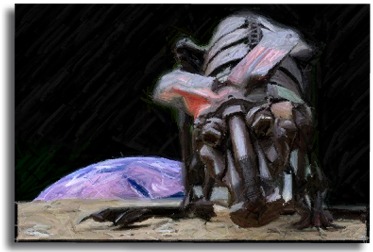Posted by Nicky Drayden on Jun 4, 2010 in
Reviews Published by: Analog Magazine, July/August 2010
 Metal Roo Image by Richard.Fisher Creative Commons
Metal Roo Image by Richard.Fisher Creative Commons
The Story:
Blame it on politics for the inhabitants of First Lunar Outpost being the recipients of a brand new Lunaroo, Australia’s contribution to the space program. It’s a robot kangaroo with a cockpit designed to hop its passengers around the lunar surface. Aussie engineer Adrian was shipped up with the Roo, and he knows it’s going to be tough selling the lunar residents on this revolutionary method of transport, but what better way to get around in 18% gravity than hopping over rough surfaces? After the Lunaroo’s maiden voyage, however, Adrian might have a hard time selling the idea to himself.
The Craft:
SPOILERS
At the heart of The Long Way Around is the interesting concept of an alternate form of lunar transport that steps away from the old moon buggy fallback. The inhabitants of the First Lunar Outpost are skeptical about how much use it will be under the hostile conditions of the moon. But beggars can’t be choosers, so moon resident Victor volunteers to go with Adrian to take the Lunaroo for a test run out to the solar furnace, five kilometers away from the base. Their plans get changed along the way, and they instead decide to venture to the Silent Earth Radio Telescope even further out.
Navigating the Lunaroo takes some getting used to, with the vehicle being sensitive to the movements of its passengers. A little body English can make turns go easier, but Victor makes a mistake, throwing his weight around and sending the Lunaroo crashing down on its side. The Lunaroo’s forward motion is busted, along with its communications, and Adrian’s knee is as well. Over twenty kilometers away from help, oxygen, and protection from the rising sun, Adrian and Victor must use their wits to find a way to save themselves from death.
The story is full of action and danger, with a hefty dose of science for those who like to geek out on telescopes, radio signals and such. Plus a dab of humor in the form of the real world bureaucracy that would send such an inept design to the moon in the first place. But I found myself wanting more from this story than just a cool concept and action. I wanted to know more about the characters and what brought them to the moon, and see more of the outpost itself. I also had a hard time getting a sense of things spatially, since the description veered towards the sparse side. It was a cute story for what it was, a quick, plot-driven romp around the moon.
Tags: Analog, kangaroo, moon, science fiction
Posted by Nicky Drayden on Feb 22, 2010 in
Reviews  Photo by Ctd 2005 Creative Commons
Photo by Ctd 2005 Creative Commons
Published by: Fantasy and Science Fiction, December 2009
The Story:
Virginia has trained hard to be the moon’s first long-term resident. She’s prepared for the vast moments of loneliness punctuated by stardom during her weekly transmissions home to Earth. Not that she’s ever felt particularly tied to one city over another, but she’s American through and through. She even entertains the Vice President who hitched a ride on a supply ship, though his visit is cut short when he receives news that the situation with some foreign country is quickly deteriorating.
Then the supply ship stops coming. It’d been blown up, and there’s no money to replace it. Through a static-filled connection, Virginia reassures the Deputy Director that she’ll be fine. The moonbase is supposed to be self-sufficient after all, and she’s better equipped to be alone up there than any astronaut outside of Russia. The Deputy Director doesn’t have the heart to tell Virginia that there’s no longer a Russia. A few weeks later, Virginia can’t get a connection to the Deputy Director at all.
The Craft: Beginnings
SPOILERS
The story opens up with a clever line about how everyone had wrongly predicted that people would quickly get bored of hearing about the mission. This line really hooked me because of the truth underneath it. Space is pretty boring. It’s forgettable, beyond thirty-second news blips. But as it turns out, people are interested in the human face — Virginia prancing around for the cameras, making the moonbase her own with posters and mementos from home. She’d been allowed to bring everything she wanted, thanks to the efficiency of the Valero thermocakes.
As the next few scenes continue, we discover that Virginia’s mission is more of a giant product placement ad than anything, with Harper-Doubleday donating a shelf of books and Benjamin Moore donating buckets of paint for which Virginia has to come up with creative uses. This scenario, as funny as it reads, strikes a chord with me. For a project like this to be economically feasible, you can bet there’d be corporations ready to drop big bucks on this mission. Why be the official sponsor of a sports stadium when you could have your name plastered across an entire moonbase?
Despite the minor inconveniences that distract Virginia from her work, things are going pretty well. The hydroponic garden is blooming, her experiments are producing results, and she’s had no detrimental health effects due to space exposure. Here we get some good grounding details and build up some setting right before all hell breaks loose. In the span of a few sentences, we go from Virginia having the time of her life to a world war. Virginia soon finds herself cut off from Earth. The reader gets a sneak peak into what’s going on through the Deputy Director’s eyes. We know despite his calmness as he speaks to Virginia that his world is about to end. This POV shift was a little awkward for me, but I enjoyed the insight that it brought, and I savored having a bit of knowledge that Virginia didn’t.
This story is high in concept and setting. From the very beginning, the character comes off as secondary, and we get to see why in the second part of this story. Virginia goes mad and her sense of self becomes entangled in the moonbase itself as she paints every surface until she has a fractal of chessboards, her mind too fluid to play just one game at a time. And just when it seems she’s got no mind left to lose, she gets some visitors, one of whom will prove that she does.
Tags: beginnings, F&SF Mag, moon, science fiction
 Metal Roo Image by Richard.Fisher Creative Commons
Metal Roo Image by Richard.Fisher Creative Commons
